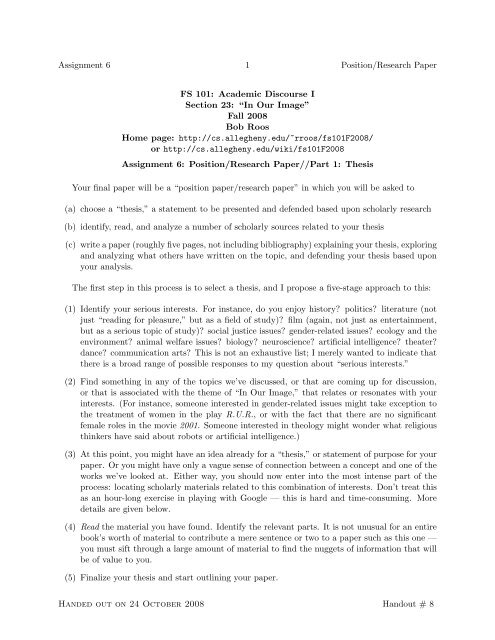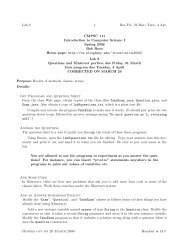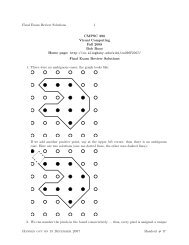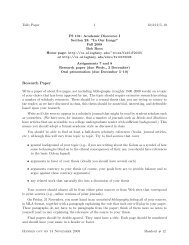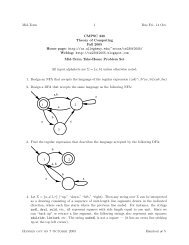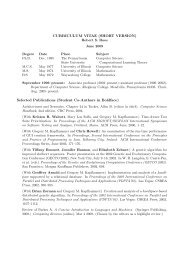Assignment 6 1 Position/Research Paper FS 101: Academic ...
Assignment 6 1 Position/Research Paper FS 101: Academic ...
Assignment 6 1 Position/Research Paper FS 101: Academic ...
You also want an ePaper? Increase the reach of your titles
YUMPU automatically turns print PDFs into web optimized ePapers that Google loves.
<strong>Assignment</strong> 6 1 <strong>Position</strong>/<strong>Research</strong> <strong>Paper</strong><br />
<strong>FS</strong> <strong>101</strong>: <strong>Academic</strong> Discourse I<br />
Section 23: “In Our Image”<br />
Fall 2008<br />
Bob Roos<br />
Home page: http://cs.allegheny.edu/~rroos/fs<strong>101</strong>F2008/<br />
or http://cs.allegheny.edu/wiki/fs<strong>101</strong>F2008<br />
<strong>Assignment</strong> 6: <strong>Position</strong>/<strong>Research</strong> <strong>Paper</strong>//Part 1: Thesis<br />
Your final paper will be a “position paper/research paper” in which you will be asked to<br />
(a) choose a “thesis,” a statement to be presented and defended based upon scholarly research<br />
(b) identify, read, and analyze a number of scholarly sources related to your thesis<br />
(c) write a paper (roughly five pages, not including bibliography) explaining your thesis, exploring<br />
and analyzing what others have written on the topic, and defending your thesis based upon<br />
your analysis.<br />
The first step in this process is to select a thesis, and I propose a five-stage approach to this:<br />
(1) Identify your serious interests. For instance, do you enjoy history? politics? literature (not<br />
just “reading for pleasure,” but as a field of study)? film (again, not just as entertainment,<br />
but as a serious topic of study)? social justice issues? gender-related issues? ecology and the<br />
environment? animal welfare issues? biology? neuroscience? artificial intelligence? theater?<br />
dance? communication arts? This is not an exhaustive list; I merely wanted to indicate that<br />
there is a broad range of possible responses to my question about “serious interests.”<br />
(2) Find something in any of the topics we’ve discussed, or that are coming up for discussion,<br />
or that is associated with the theme of “In Our Image,” that relates or resonates with your<br />
interests. (For instance, someone interested in gender-related issues might take exception to<br />
the treatment of women in the play R.U.R., or with the fact that there are no significant<br />
female roles in the movie 2001. Someone interested in theology might wonder what religious<br />
thinkers have said about robots or artificial intelligence.)<br />
(3) At this point, you might have an idea already for a “thesis,” or statement of purpose for your<br />
paper. Or you might have only a vague sense of connection between a concept and one of the<br />
works we’ve looked at. Either way, you should now enter into the most intense part of the<br />
process: locating scholarly materials related to this combination of interests. Don’t treat this<br />
as an hour-long exercise in playing with Google — this is hard and time-consuming. More<br />
details are given below.<br />
(4) Read the material you have found. Identify the relevant parts. It is not unusual for an entire<br />
book’s worth of material to contribute a mere sentence or two to a paper such as this one —<br />
you must sift through a large amount of material to find the nuggets of information that will<br />
be of value to you.<br />
(5) Finalize your thesis and start outlining your paper.<br />
Handed out on 24 October 2008 Handout # 8
<strong>Position</strong>/<strong>Research</strong> <strong>Paper</strong> 2 <strong>Assignment</strong> 6<br />
Finding Scholarly Sources<br />
You can start with the Web, but don’t stop there. Sometimes there is no substitute for locating a<br />
promising section of books in the library (e.g., the section on Mary Shelley, the section on sciencefiction<br />
films, the section on technology and ethics), plucking books off the shelf, and searching<br />
through the index. Here are some more concrete approaches:<br />
[Focused search.] If you already know your thesis, you can do a very focused search for material<br />
related to it. For instance, if you intend to examine the subject of “Frankenstein’s monster as<br />
Everyman” you will need to look for information about “Everyman” — what are the classic literary<br />
treatments of “Everyman”? What features does Frankenstein’s monster have that are reminiscent<br />
of Everyman — has anyone ever written about the monster as a symbol of the ordinary person?<br />
[Area-specific search.] If your thesis is less well-defined, you might still be able to search for<br />
likely works that will help you narrow it down. For instance, if you want to say something about<br />
the Golem and notions of social justice, you might need to find books in the library that talk about<br />
the Golem. Search Google books and Google scholar for books of essays or articles that seem to be<br />
in relevant journals. You might need to order things from EZBorrow if they are not in our library.<br />
Use the reference in these books and articles to find more. As you read, you should jot down ideas<br />
— this may lead you to formulate a more concise thesis.<br />
[Source-specific search.] Choose a section of the library related to your interests and “scan<br />
the shelves” (you can also do this via keyword search, I suppose, but sometimes your eyes can<br />
pick up something that a search doesn’t turn up). Or choose a promising-sounding journal in the<br />
library’s online collection of journals and do a search within its pages. Or sit down and read (or<br />
skim through) a book specific to your topic or area of interest, looking for side-paths to explore or<br />
references to other works. This is more of a hit-or-miss approach, but as long as you don’t devote<br />
too much effort following a path that leads nowhere, you might find this fruitful.<br />
For Monday: on the “Scholarly Resources” link, place at least one entry. If it is not about a<br />
specific resource, it should at least identify a general “connection” between a topic in the course<br />
and a possible thesis topic or area of interest.<br />
Handout # 8 Handed out on 24 October 2008


